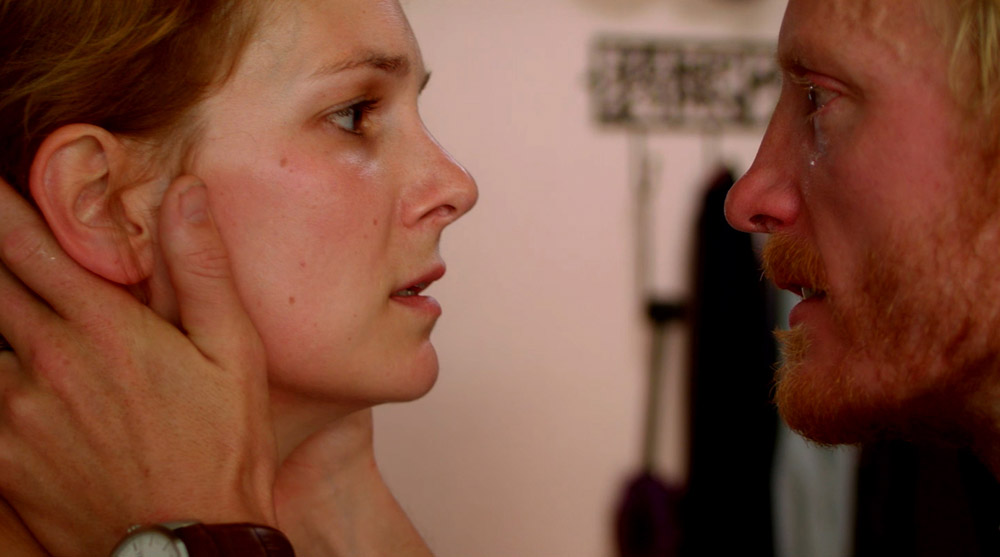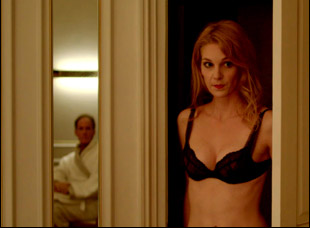The weather was a bit cloudy on the day Josephine Mackerras was going out to get the final shot for her feature debut “Alice,” and the writer/director couldn’t be more thrilled. A clear blue day was what she had in mind for the exterior shot in the forest, and the mood of the production had been as glum as the overcast skies for having to make the hour-long drive from its base in Paris out to the forest, but something funny happened as the city disappeared behind them — it was as if they were wading deeper and deeper into their movie.
“It’s funny because when you see the shots, the fact that it was cloudy means that you can’t see Paris,” recalled Mackerras of the all too literal silver lining. “You really could be in the middle of nature, so it’s like this perfect sheet [of clouds], so that shot at the end could go on and on and on. It was like, what a gift.”
There couldn’t have been a more fitting conclusion for “Alice” than for its filmmaker to get exactly what she wanted in a different way than she had imagined, ideal for a film full of surprises that continued to upend expectations all the way up to winning the SXSW Grand Jury Prize for Best Narrative Feature last spring. The first of these shockwaves arrives for its title character (Emilie Piponnier), who lives in the cold comfort of domesticity with her young son Jules and her husband Francois (Martin Swabey), a pensioner who’d rather be a novelist. His dissatisfaction leads to his disappearance, leaving Alice to care for Jules alone while finding a way to keep a roof over their head when Francois’ left the family deeply in debt, but among the other things he’s left behind is the number for a high-end escort service, which intrigues his wife for reasons besides his evident infidelity.
Although “Alice” shouldn’t be construed in any way as autobiographical, it’s difficult to separate it from Mackerras’ life after the writer/director decided to make her apartment Alice and Francois’, cast her own child as theirs and thrust herself into mounting credit card debt to make a film on her own terms, echoing the circumstances that lead Alice to desperate measures. Yet as Alice delights in finally seeing the benefits of saying yes to others so often after being constantly chastised by Francois for her inability to say no, it becomes glorious to witness how Mackerras gave herself the permission to put such an unusual spin on the tale of a woman looking to break free of the path that’s been charted out for her, reminding no less of Luis Bunuel at first because of its immediate parallels to “Belle du Jour,” but then in its utter confidence in its unique tone. As visually lively as it is narratively spry, the film moves effortlessly between drama and comedy and finds a way to enchant audiences out of Alice’s most devastating moment.
Recently, on the phone from her native Australia, Mackerras spoke about betting everything on herself with “Alice” and having it yield such strong results, as well as what attracted her to the director’s chair after training as an actress, how she was able to get authentic performances from her actors and going to the mat for the shots she needed.
I wrote a feature that got optioned to an Oscar-winning producer, and it took a long time to get to that point. I was in preproduction for that film, which had been bigger and I fell pregnant accidentally, so it was pushed and then pushed and it all went pear-shaped. I was disappointed with the whole thing and I got really impatient to make my first movie. There’s this whole psychological process of selling your script, getting into preproduction and getting going [thinking], “Okay, I’m going to make my movie” and then that gets taken away from you, so this frustration built up inside me. I wrote “Alice” to be low budget — I wanted to keep it small in case I didn’t get the money because the experience before that, I just felt like I didn’t have any control over anything and in the back of my mind, because I come from shorts, I know you can just go ahead and do it [as long as you think] what resources do I have?
Like your son Jules…
Yeah, he was fantastic. He actually really impressed me on set. It’s difficult in the sense that young kids are always more difficult with their mother than anybody else on the planet, but also I think he wasn’t seeing me as much [during the production], so he’d come on set and he’d want all my attention, but then he loved having all these people in his apartment. Emilie and Martin and Chloe were all so good with Jules and that really helps to get that naturalistic performance. Also, it gave me a freedom [because] we needed shots of him sleeping, so I could just go into his bedroom at 1 a.m. and get the shots, which you probably couldn’t do if you hired a baby. [laughs]
This is probably not all that different than most directors who are eating, sleeping and breathing their film, but when you incorporate as much of your own life into this, did it feel like you were inside of this 24/7?
Totally. Even the editing was in my bedroom. This was absolutely all-encompassing. I was diagnosed with adrenal fatigue afterwards and really pushed myself to the limit because I was doing everything, [though] I couldn’t do it without all the people that helped. But you get a lot of magical things where the locations would just come through and [other] things [where we] were just like, “Thank God.” The right lighting. There were so many things where it’s like we had a helping hand.
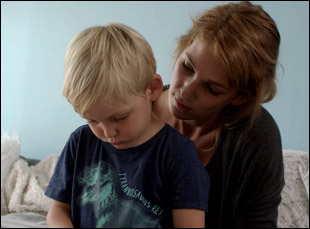
I’ve got really a huge debt of gratitude towards [casting director] Elise McLeod because she not only found Emilie, but she put me in contact with a whole community — all the smaller roles in this film are played by wonderful actors and of course, Emilie is fantastic. Because I come from the theater, working with actors is one of my greatest loves along with writing and editing, and one of the real forces of the film is that even the smaller roles are played to perfection. Each of these actors is an artist in their own right and those are the actors I love to work with.
You actually started out as an actress. How did you gravitate towards directing?
It’s interesting because I went to London and I had the opportunity to get with a big agent, Helen Mirren’s agent [at the time] and that was very exciting. I really got my foot in the door and she was going to sign me. She really was an artist in terms of the way she described to me what my future could hold as actor, and it was starring in things like “Home and Away” and those smaller television things and then moving onto [bigger things]…and I remember going home and thinking I didn’t want to do this. This is not my dream. It’s almost like I needed to get close to the dream of making money as actor to realize I had way too much to say. I realized I wanted to make movies. I went to New York and took a course and I realized it was like finding God for me because it just had everything I loved – performance, the writing, the music — I used to play the saxophone — and art, because I used to paint. Everything I love was all put together in this thing called filmmaking and it was like I found the thing I want to do for the rest of my life.
You can see that artistry throughout the film, but in particular the sequence in the middle where the colors really tell a story from a bedroom bathed in blue where Alice talks to her disapproving mother, to the scene directly after where the fire she starts to incinerate her past lights the scene and you can see the contrast in her attitude so strongly.
It’s really interesting because it was really worked on and that scene in the bedroom, the weekend we shot that was further down the line and we had more time than we usually had, so Mickael [Delahaie, the cinematographer] and I were really able to work what we wanted and talk about colors and even with the performance, Emilie and I could really work the way we both wanted to work. It was like, “Wow, imagine if we had a budget. This is how things would be all the time.” [laughs] That blue is just the night, but that’s the whole point that she’s in this cocoon, and then it’s funny because in the original script, the burning of the photos was originally [supposed to be] her throwing things out the window and making a big bonfire, because it’s the moment of transition. That was an identity shift, so it was really important for me to get that. Honestly, all we could do is the fire so we just really needed to bring it close and then what’s wonderful about my apartment is it has these balconies, so we could get these shots and it was Mickael’s idea to put the camera outside. It just looked great.
The light tone was so surprising given the subject of sex work. Did talking to those that worked in that field inform that?
I had done a lot of research before I went into the writing, and this comes from the character of Francois, because Francois wouldn’t go pick someone up off the street for a $30 blowjob. Part of his addiction is the high-end. It is the money and the five-star hotels, which is connected to his background, so that was what I was interested in. They’re the women I spoke to, where they’re really paid a lot of money, and it’s interesting because this story I heard again and again is that the women were respected and it was an exchange and it got them through [a tough financial time] and it paid off the house or it got them through university.
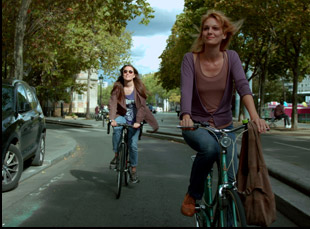
Yeah, [like] the crying client, that’s actually based on something that really did happen from the stories I heard and what’s interesting is you’ve got the young guy who is very successful and just wants to get laid and not have any complications, and then you’ve got the older, very successful businessman who’s got a lot of emotional problems and in a way, being an escort is also slash therapist because there’s an understanding that whatever happens between those four walls doesn’t leave, like in a therapy session. So I think women often do see stuff that’s not dissimilar and they have to be that safe, nonjudgmental space.
I’ve heard the first two weeks of shooting were primarily the Alice and Francois scenes – was that actually to create base memories of that relationship for those actors before they go their separate ways?
It was simply because we did all the apartment stuff [first], so that’s all Francois and Alice. There were two apartment scenes we shot well after. And Martin Swabey, he’s a wonderful actor and he just wanted to go all the way. I gave him a very thorough backstory for Francois and he just ran with it at a million miles an hour and just made it his own, so he had the idea that he wanted to starve himself for shooting all the stuff that happens after he comes back, so if you watch the movie, you’ll see there’s a real physical difference in Francois at the dinner party and then at the kitchen scene [because] I don’t think he ate. It was a real gift to the film.
Did you get to do much prep with Emilie? I understand she came aboard only a few weeks before shooting.
Not as much as we wanted, that’s for sure, but we took a lot of time on set. Everything was about her performance because Alice is the movie. We had to be connected to her the whole time, so a lot of the important scenes we would come back to when she had more time to prepare and then on set, if I needed to do 23 takes, I did it. Often I didn’t. It depended on the scenes. And if it wasn’t good enough, it just wasn’t in the film.
The scenes where Alice and her friend Lisa, played by Chloe Boreham, can be seen shouting so publicly in the canals, I imagine you only had a handful of takes to get that.
That was one take and we had a big fight to get it because the director of production was just freaked out about the legalities. I knew I needed the shot and then she’s telling the [actresses] about vermin and the rats that lived in the [canals], and like champions, they jumped in and we had people on the side waiting with blankets and [they] rushed back to the shower, scrubbing themselves with disinfectant. Thank God we got it. It’s in the trailer.
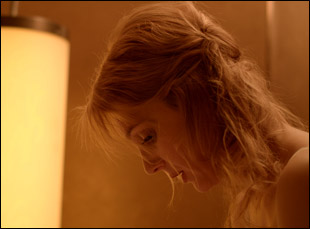
It’s been absolutely amazing. The deliveries are a nightmare and nobody warned me, but Elliot Grove came onboard and helped me out with that. And it’s been incredible. From the moment we won South By, which was surreal, it gives you status. It really brought this little tiny film out and it’s interesting, [because] just before I got into South By, I’d hit rock bottom. I was so exhausted. I’d gone through all my money and I was flying back to Australia and it dawned on me, because you have this kind of naivete that if you make a good film, people are going to buy it and people are going to see it, but actually, that’s not necessarily true. If you don’t have name actors in your film or the big producer, it can disappear. Making a good film isn’t enough. So I thought, “Oh my God, this film could disappear into nothing,” and just like an hour later, I got a call from South By Southwest saying the film had been accepted into it, which was fantastic. So that in itself, and then to win the Grand Jury, it’s like thank you SXSW. I probably say that every day.
When it’s your first feature, is it what you thought it would be?
It was a lot more work. The most important thing to me now is I really know myself as a director, like how I work and how to listen to myself. There’s something about that that’s very precious, to know you can do it. I thought once I get the shooting done, this anxiety will go away, but it’s like no, no, no, once you get into the editing room, so many things didn’t work with the genre shift between the comedy and the melodrama and then the thriller – all these things that producers told me, “That doesn’t work, you can’t put all that in one film. You’ve got to choose your genre.” And it was like, “What? I didn’t read that book. I missed the memo.” But it’s the story I want to tell.
“Alice” opens on May 15th in virtual cinemas, with proceeds split to benefit your local arthouse.




